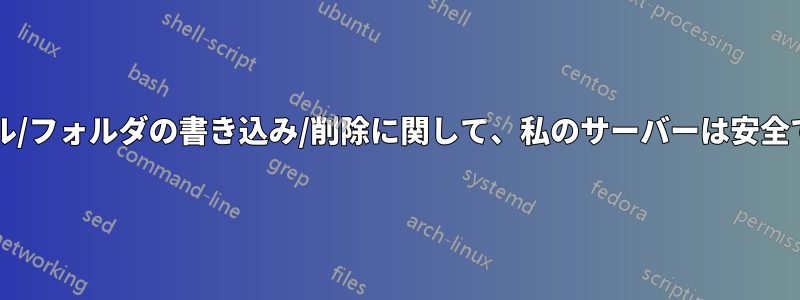
誰かが非ルートアカウントを使用して私のサーバーにアクセスした場合、どの程度の損害を与えることができるのかを知りたいです。
その後、su someuserこのコマンドを使用して、書き込み可能なすべてのファイルとフォルダーを検索しました。
find / -writable >> list.txt
結果はこちら. ほとんどは/dev/somethingと/proc/somethingで、これら
/var/lock
/var/run/mysqld/mysqld.sock
/var/tmp
/var/lib/php5
私のシステムは安全ですか? /var/tmp は理にかなっています。しかし、なぜこのユーザーがそれらのフォルダーへの書き込みアクセス権を持っているのかわかりません。変更すべきでしょうか?
stat /var/lib/php51733 という奇妙な値が表示されます。なぜ書き込みアクセスがあるのか? なぜ読み取りアクセスがないのか? これは、一時ファイルの奇妙な使用法なのでしょうか?
答え1
ユーザーは、特定のソフトウェアを実行するために、特定のシステム レベルの領域にアクセスする必要があります。たとえば、/var/run/mysqld/mysqld.sockデータベースと対話するには、アクセス可能である必要があります。
/var/run には通常、Unix ソケットや pid ファイルなどのランタイム データが格納されます。
/var/lock には、ソフトウェアが読み取り/書き込みの衝突などを防止し、ファイルの排他的オープン (ファイル ロックなど) を可能にするロック ファイルが含まれています。
/var/lib/php5 には非常に特殊なファイル アクセス モード (1733) があります。先頭の 1 が重要です。
からman chmod
1000 (the sticky bit). See chmod(2) and sticky(8).
したがって、次のようにman stickyなります:
STICKY DIRECTORIES
A directory whose `sticky bit' is set becomes an append-only directory,
or, more accurately, a directory in which the deletion of files is
restricted. A file in a sticky directory may only be removed or renamed
by a user if the user has write permission for the directory and the user
is the owner of the file, the owner of the directory, or the super-user.
This feature is usefully applied to directories such as /tmp which must
be publicly writable but should deny users the license to arbitrarily
delete or rename each others' files.
つまり、これは、ユーザーがディレクトリ内にファイルを作成または編集できるが、ファイル自体の所有者だけがファイルを削除できる特別なセキュリティ モードです。


